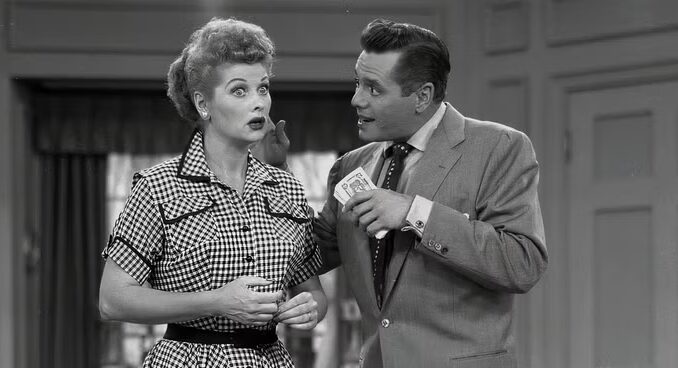
For decades, I Love Lucy has stood as one of television’s most beloved comedies — a classic that defined humor, timing, and the golden age of sitcoms. Lucille Ball’s portrayal of Lucy Ricardo, the well-meaning but mischievous wife, continues to charm audiences around the world. Yet, in recent years, fans online have been reexamining her antics from a totally new angle. According to a viral fan theory, Lucy’s endless plotting and scheming might not just be funny — they might be mafia-like. Once you start seeing the evidence, it’s hard to unsee it.
Lucy Ricardo as a Mafia Mastermind
This fan theory playfully reimagines Lucy as a mob boss in disguise — a woman running her household and neighborhood with the same cunning and charisma as a leader of a criminal empire. Rather than being a clumsy troublemaker, Lucy becomes the ultimate strategist: manipulating, persuading, and pulling the strings behind every wild plan.
Her endless schemes to sneak into Ricky’s shows, buy luxury items, or outsmart her friends aren’t just impulsive — they’re power plays. As one fan quipped, “Lucy doesn’t just bend rules. She runs them like a business.” Whether she’s convincing Ethel to help with a crazy plan or talking her way out of Ricky’s scolding, Lucy always stays one step ahead — the mark of a true mastermind.
The Long Con: Lucy’s Genius in Action
If you think about it, Lucy’s antics mirror the structure of a perfect con job. Each episode begins with a goal, followed by careful planning, disguise, teamwork, and ultimately, chaos. She ropes in her loyal accomplice Ethel, devises elaborate disguises, and infiltrates forbidden spaces — from chocolate factories to nightclub rehearsals.
That level of strategy is what makes fans draw comparisons to organized crime storytelling. It’s not about violence or corruption — it’s about intelligence and influence. Lucy knows how to persuade, charm, and manipulate to get what she wants, often with hilarious results. One fan summed it up perfectly: “Swap out chocolate for counterfeit cash, and Lucy’s basically running a small-time mob.”
Charm as a Weapon
Unlike typical “mob bosses,” Lucy never relies on intimidation. Instead, her greatest weapon is persuasion. She uses emotion, humor, and quick thinking to control every situation. When Ricky gets angry, she plays innocent; when Ethel hesitates, she flatters and coaxes her into joining the scheme.
Fans joke that this makes Lucy the “queen of emotional manipulation” — the kind who could lead a team of loyal followers without anyone realizing she’s in charge. Even Ricky, with his fiery temper, always ends up forgiving her. Like a true crime boss, Lucy keeps everyone close, loyal, and slightly afraid of what she’ll try next.
The ‘Family Business’ Theory
Some fans have even taken the comparison further, suggesting that Ricky Ricardo’s nightclub could serve as the “front” for Lucy’s behind-the-scenes machinations. It’s where everything happens: meetings, performances, chaos — and Lucy’s constant attempts to infiltrate his business.
The dynamic between Lucy and Ricky, when seen through this lens, becomes even more hilarious. Ricky’s famous catchphrase — “Luuuucy, you got some splainin’ to do!” — suddenly sounds like a mob boss confronting his partner for attracting too much attention to their secret dealings. It’s a stretch, sure, but an entertaining one that gives the show a tongue-in-cheek, Godfather-style twist.
The Loyalty Network: Ethel and Fred
No mafia runs without loyalty, and Lucy’s inner circle fits that pattern perfectly. Ethel Mertz is the consigliere — the trusted friend who follows Lucy into every scheme, no matter how wild. Fred, the grumpy landlord, plays the reluctant enforcer, always cleaning up after the chaos. Together, they form a “crew” bonded by shared secrets, laughter, and the occasional disaster.
Even when things go wrong (and they always do), the group sticks together. That sense of unbreakable loyalty is both the heart of the show and what makes the mafia comparison so oddly fitting. Whether it’s family, friendship, or sheer survival, Lucy’s world thrives on bonds that can’t be broken — no matter how many chocolate conveyors go haywire.
Why Fans Love This Theory
The appeal of this fan theory isn’t in proving Lucy’s criminality — it’s in recognizing her power. In a 1950s television landscape filled with passive housewives, Lucy Ricardo stood out as bold, clever, and fearless. She challenged norms, defied authority, and took control of her life — all with comedic brilliance.
By viewing her as a “mob-style mastermind,” fans are celebrating that same fearless energy. Lucy’s not a villain — she’s a woman who refuses to accept “no” as an answer. She uses charm instead of force, chaos instead of control, and comedy instead of fear. In that way, she embodies the kind of strategic strength often reserved for male antiheroes — but with lipstick, laughter, and perfect comic timing.
The Bottom Line
Of course, Lucy Ricardo isn’t really running a mob empire — but the comparison shines a light on why she remains such an iconic figure. She’s more than a mischievous housewife; she’s a brilliant tactician disguised as a comic genius. Her schemes, her loyalty, and her ability to get what she wants — all point to a kind of power that audiences still admire today.
So, the next time you rewatch I Love Lucy, pay attention to her elaborate plans, her persuasive tactics, and that gleam in her eye when she’s about to pull off something outrageous. Suddenly, her laughter will sound a little more strategic — and you might just find yourself thinking:
Lucy Ricardo — the funniest mob boss who never was.